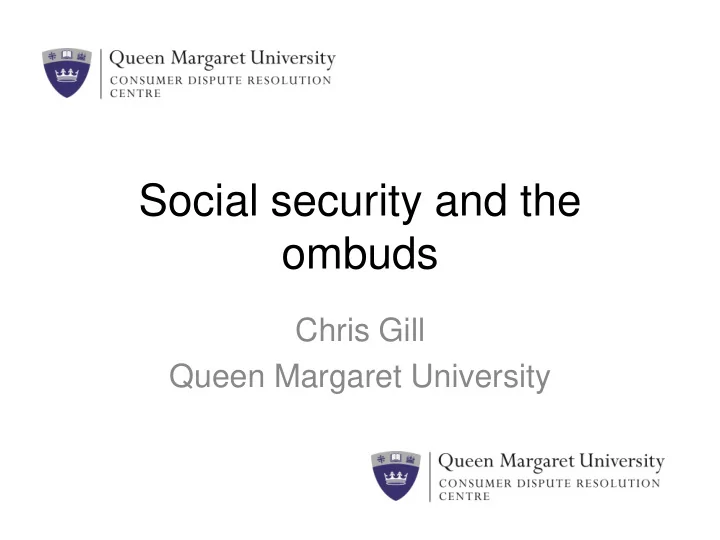

Social security and the ombuds Chris Gill Queen Margaret University
Social security and the ombuds The Scottish Welfare Fund The SPSO’s innovative new role Complaints approach for the new social security arrangements
Development of the Scottish Welfare Fund Pre-31 March 2013 : DWP administered discretionary social fund payments. Internal review by DWP staff + independent review by the Social Fund Commissioner. 31 March 2013 – 1 April 2016 : Non statutory national scheme guided by the Scottish Government and delivered by Local Authorities. 1 st tier review + 2 nd tier review by Local Authority panel. 1 April 2016 – present : Scottish Welfare Fund established on a statutory basis by virtue of the Welfare Funds (Scotland) Act 2015. SPSO begins to conduct second tier reviews.
Longstanding concerns “… the diverse range of research studies “The majority of the literature reviewed and other material reviewed here conveys focuses on administrative difficulties with a sense of limited achievement in the Social Fund… There is support for the delivering the social fund’s objectives, aims of the Social Fund, however, the coupled with substantial shortcomings in majority of the literature is critical about its a number of areas” (Buck and Smith administration” (Grant 2011) 2005) “The majority of unsuccessful or partially successful respondents did not ask for a review, mainly because they were not aware of that right; did not know on what exact grounds their application was rejected; felt grateful for a partial award; felt the review would not be successful; or had resolved their need.” (Sossenko et al 2014)
The SWF scheme: key features National scheme Funding: £33 million/ Funding is capped (may delivered by Local year (2013-2016) be topped up by LAs) Authorities Crisis Grants = disaster or emergency. 66,970 applications for 208,060 applications to Community Care Grants Community Care Grants the Scottish Welfare = helping people live and 143,350 applications Fund in 2015/ 2016 independently in the for Crisis Grants community.
Reviews (2013 – 2016) Community Care Grants: • 9,300 tier 1 reviews. The original decision was revised in 48% of these cases. • 800 reviews tier 2 reviews and 40% of these revised the original decision. Crisis Grants: • 3,700 tier 1 reviews were received. Decisions were revised in 48% of these cases. • 300 tier 2 reviews for Crisis Grants and 52% of these were revised.
Drop in applications and reviews DWP received 376,500 applications in its last year of Independent Review Service operation 2012/ 2013, for Social Fund 2010/ 2011 = compared to 208,060 8290 second tier reviews applications for SWF in 2015/ (Social Fund Commissioner 2016 (DWP 2013; Scottish 2011) Government 2016) Interim arrangements operated by local authorities April 2013 – March 2016 = SPSO arrangements since 1 April 2016 – no statistics 1200 second tier reviews (or 400 second tier available yet reviews/ year ) (Scottish Government 2016)
Possible reasons? Not provided with Grateful to get Lack of reasons review anything when a provided in information/ partial award decisions decision given Discretionary matters presented Too emotionally as fixed rules by draining decision makers Sosenko et al (2014)
The SPSO and the SWF Second tier reviewer from 1 April 2016 1 st major involvement of the SPSO with social security matters Innovation – ombuds with an integrated appeal jurisdiction, in addition to the traditional maladministration remit Similar model to the Independent Review Service of the Social Fund Will second tier review numbers recover?
Where else could model be used? “The independent review combines a review and appeal function in one process. I believe it represents an efficient, cost-effective administrative law dispute resolution model, which involves the customer meaningfully in the process and is accessible, timely, proportionate and fair. Given these characteristics… it is disappointing that this model has not been adopted more widely, as a means by which citizens can challenge administrative decisions” Social Fund Commissioner (2013)
Complaints and social security consultation Should the complaint process be based on the SPSO’s statement of complaint handling principles? The consultation assumes that the new agency will come under the SPSO’s jurisdiction. This will require ‘listing’ the agency in Schedule 2 (Part 2) of the SPSO Act 2002 using the provisions in Section 3 (2) of that Act to make an Order in Council. Once the new agency is listed in Schedule 2, it will automatically be required to operate a complaints procedure that complies with the Statement of Complaint Handling Principles under Section 16A of the SPSO Act 2002 (amended by the Public Services Reform (Scotland) Act 2010).
Opportunities to do more… Embedding complaints Creating a new agency process within Using complaints for culture of valuing organisational learning learning and innovation complaints systems Proactive involvement of Extension of the SPSO’s Training arrangements the SPSO in new ‘Learning and for new staff (e.g. SPSO monitoring and scrutiny Improvement Unit’ pilot training unit and e- arrangements (e.g. any to the new agency learning) newly created SSAC equivalent) Publication of complaints The new agency should The new procedure adopt the PHSO’s data conforming to should be set up with SPSO recommended Principles of Good reference to the SPSO’s standards (e.g. the Administration (or the Complaints Improvement performance indicators SPSO should develop Framework for the LA model CHP) principles for Scotland)
Some larger ombuds questions Should the ombuds relationship with the Scottish Parliament be strengthened and a dedicated committee created to receive his or her reports? Scottish citizens can (or will be able to) to challenge (most) administrative actions by Scottish and UK public agencies in Scottish courts and tribunals. Should the Scottish ombuds have a UK jurisdiction for complainants living in Scotland? The other devolved nations either have or are seriously considering own initiative powers of investigation. What is the scope for these powers in Scotland? There is currently no central repository of complaints data across Scotland despite standardised reporting requirements. How is the CSA role working and to what extent is the data being collected used to improve routine service delivery?
Recommend
More recommend